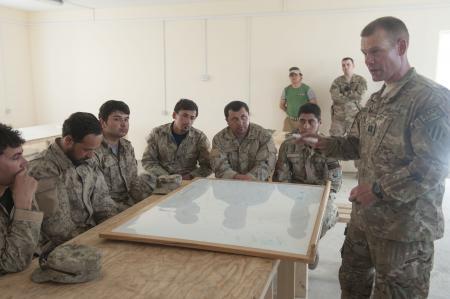
RAND SFA Paper – A recently published (October 2017) 253-page paper by the RAND Corporation provides a history of the U.S. military’s advisory efforts over the past several decades and offers some recommendations on how security force assistance (SFA) programs can be improved. The paper explores six historical case studies and attempts to draw conclusions about the relationships between armies and nation-building and the potential role of SFA.
Alternative Approach to SFA. This RAND SFA paper proposes an alternative approach to Security Force Assistance (SFA) that stresses the importance of ideas, identities, and ideology. It argues that U.S. SFA efforts focuses too much on force structure, capacity, readiness, and capabilities – while not paying sufficient attention to the larger nation-building aspects of SFA and Security Assistance (SC) programs.
Six Case Studies. The paper uses historical case studies to analyze the relationship between building armies and building nations. The case studies are analyzed in six different chapters of the paper – one case study (country) per chapter. Three are large scale U.S. advisory efforts – Korea, Vietnam, and Iraq; and three are postcolonial states – Ghana, Mali, and Nigeria.
SFA – Success and Failure. The past advisory efforts in Iraq, Afghanistan, and other locations around the world have resulted in some successes and failures. The SFA program in Korea is considered a success – partially because of infusing within the Korean military a national identity that helped to reinforce state legitimacy.
While the South Vietnamese army (advised and trained by the U.S.) was molded into a successful fighting force (lots of opinion on this topic) to oppose ‘main force’ North Vietnamese units it was less successful in conducting counterinsurgency and did not exhibit a great sense of loyalty to the government. According to the RAND paper part of the failure of the Vietnam War was the lack of a coordinated nation-building effort that tied the military to the government.
In Iraq, the U.S. seemed to repeat the mistakes of Vietnam – working hard to build up a military but without taking care of the political affairs that would bind the Iraq military to the nation and its government. This was readily seen in the collapse of the Iraqi army in the face of the Islamic State offensive in 2014.
The paper also examines U.S. SFA efforts in several African nations. Mali has seen several SFA iterations – many of these training programs conducted by U.S. Army Special Forces. The Pan-Sahel Initiative (PSI) that began in 2003 and the Trans-Saharan Counterterrorism Partnership (TSCTP) that began in 2005 have been considered successful SFA efforts. The training efforts by SF teams under the direction of the Joint Special Operations Task Force – Trans Sahara (JSOTF-TS) were of a military nature focused on counterterrorism and counterinsurgency. However, the paper finds that tying the training to a national identity and developing a force that observed the ‘rule of law’ was not a priority – which may have contributed to diminished results down the road.
The New SFA Brigades. The advisory teams formed and deployed to Iraq and Afghanistan for most of those conflicts (OIR and OEF) were ad hoq in nature. Teams of advisors were thrown together with little training or preparation and sent into a combat zone to conduct a training and advisory mission. The U.S. Army has learned from the past and has now adopted a new organizational structure for a permanent advisory force – the Security Force Assistance Brigades or SFABs. So the U.S. Army appears to be well on the way to professionalizing its advisor organizations – in the context of training, advising, and assisting foreign military forces. But . . .
SFA – More than Warfighting Capabilities. According to the authors of this RAND SFA paper the historical SFA programs have been focused “on technical matters such as force structure or readiness.” The paper argues that SFA should increase it’s focus on a military force’s “development within the context of the larger nation-building project.” With this suggested alternative approach to SFA the authors of the paper believe the Security Force Assistance programs of the future will be more successful.
The RAND SFA paper can be read online or downloaded:
Building Armies, Building Nations: Toward a New Approach to Security Force Assistance, October 2017, 253-pages. www.rand.org/pubs/research_reports/RR1832.html
Read more articles about Security Force Assistance posted on SOF News.